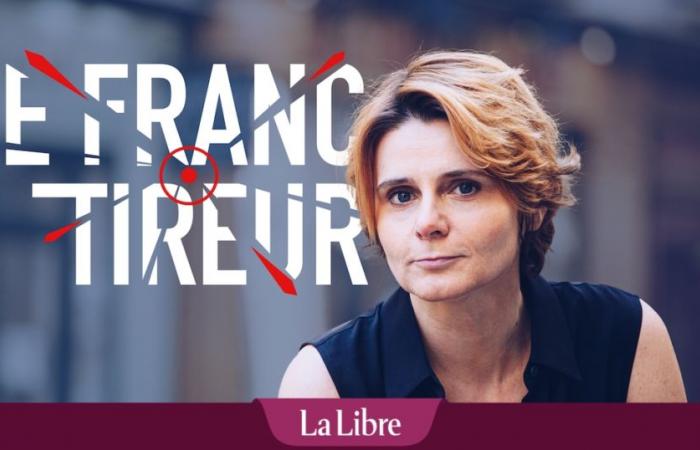Cutting off heads, rightly so, while causing collateral damage… isn’t that inherent to any revolution?
Yes, of course. This is the reason why I speak, from the first lines of my book, of “necessary vertigo” to describe the MeToo movement. Let me be clear: I regret nothing about the transition we are going through, it is absolutely invigorating and necessary. The whole book talks about how this shift is a change in the world that I desired. I am happy to live in the post-MeToo world, and I talk about what the heavy silence was like, the loneliness before MeToo.
What I denounce is the instrumentalization of this movement: it is time to separate the wheat from the chaff, to identify when it is MeToo and when it is not MeToo. I am allergic to injustice, and as a journalist, I am committed to ensuring that public speech serves to protect and not to crush.
Let's keep #MeToo and evacuate the #BalanceTonPorc movement, which has sometimes thrown away the names of innocent people, is this what you defend?
I don't think we should throw all BalanceTonPorc into the river. For my part, I am more in favor of “name and shame”, but it is a huge responsibility that cannot be handled just like that. There should be no question of denouncing a micro-annoyance or sexual offense in public. It must be the weapon of last resort, when we are faced with a wall of impunity, with a predator.
BalanceTonPorc was, for example, used to name Tariq Ramadan (the preacher was sentenced on appeal in Switzerland for rape and sexual coercion to a prison sentence of three years, one year of which is closed, Editor's note). Until then, I lived with the testimonies of around ten women who did not dare to speak publicly, either because they had received threats, or because they felt too alone in the face of what they were going to endure if they were talking. In this case, BalanceTonPorc constituted a real liberation because it was used as a means of recognizing oneself and filing a collective complaint.
Conversely, when BalanceTonPorc was used, just after the Weinstein affair, to name and accuse a man like Eric Brion (the former boss of the Equidia television channel had been accused of sexual harassment by Sandra Muller, the the initiator of the BalanceTonPorc movement, Editor's note), this man who lost everything, his job, his wife, when in reality he was accused in 140 signs of a serious statement under the effect of alcohol which he excused the next day, it's an abuse of power. There, we take the risk of unleashing a pack against an individual, of committing an abuse of power ourselves. This is the reflection that I try to invite in my book: after MeToo, it is also a new power. And when you are a feminist, you think about the use of power.
“The shame has changed sides, but so has the pack,” you write. Do we even have the right to nuance on MeToo?
Yes, it must. We lack nuance, as we lack responsibility. To bear witness, to alert, to ensure that others recognize themselves in an experience, so that they can be more vigilant in the future, to provide a shield and break the silence, networking is an undeniable benefit.
“SLAPP lawsuit”: Is press freedom threatened in Belgium?
On the other hand, it is the pack spirit inherent in the functioning of social networks which can tip this benefit into abuse. It’s the pack mentality that’s driving MeToo adrift. We must therefore ask ourselves when we do or do not call on the pack.
We feel you yourself are torn, in your book, as to how to react and act in the face of the testimonies of women who come to you on the subject of the “predatory” behavior of Tariq Ramadan…
Yes, and I formed an ethic for myself on this occasion: I do not believe that we can speak for the victims.
In my book, I tell for the first time in detail everything that was before and after MeToo through the cases that I was able to come across, such as the Ramadan affair. This bears witness to the “tugs and tears”, it's true, that I went through, of the ethics that we are obliged to form for ourselves. Let me explain: one might think that faced with my worst enemy (Caroline Fourest is also the author of “Frère Tariq”, a book in which she dissects the speech and methods of the Islamologist Tariq Ramadan, Editor's note), I could use the words of these women to publicly accuse him. In practice, it's not that simple. You cannot accuse someone publicly if the victims tell you that they are too afraid of him to say it publicly, if they were threatened and did not want to file a complaint.
On the other hand, what I also learned on this occasion is that it is easier for victims to name and accuse several people. Moreover, on a journalistic level, I think that the seriality of complaints, for serious and similar facts, constitutes one of the conditions before naming people publicly. It is very difficult to bring a name into the public arena that will immediately suffer an explosion, in a case of word against word where we have very little information to know whether or not it is a real accusation.
Is it “simpler” today than yesterday to publicly denounce a famous, rich person who has power? Should the case of footballer Kylian Mbappé, recently accused of rape by a woman during a stay in Sweden, invite us to think?
Yes, it's easier today to denounce a public figure. In reality, we are experiencing a sort of schizophrenia since the Weinstein affair: On the one hand, we are witnessing very strong media coverage of cases affecting celebrities and personalities, even if it means publishing astonishing articles which violate the private life of these people more than they denounce rapes. On the other hand, sexual violence continues to break up families and child crime remains a subject that is insufficiently addressed. My great fear is therefore to see the MeToo movement reduced to these less and less serious accusations against celebrities, with the risk of creating a disconnect between this small community and the rest of society.
Furthermore, since you highlight the case of Kylian Mbappé, I wrote my book precisely seeing this type of business coming. We don't know what really happened in that hotel room. I hope that the investigation will shed some light on what happened. But in a world where it is not possible to doubt in the name of “I believe you”, Mbappé is necessarily guilty. And in a country like Sweden where the legislation has changed in the wake of post-MeToo emotion, it is up to him to prove that he has obtained the consent of the victim, otherwise he will be condemned. This creates opportunities for individuals who are not only well-meaning.
To get out of this, you suggest debating this “gray zone” which generates so much misunderstanding between girls and boys. How to continue to seduce? Some men have told you that they are totally lost today…
Yes, some men are lost, and that's a good thing. That means they're starting to ask questions, and it's about time they asked some questions. Now, we must take advantage of this fear – which must continue – to move people towards truly positive questioning. They must learn to put themselves in women's shoes. If men learned to seduce better, they would do less damage and be more fulfilled themselves.
“The speeches of the powerful are full of anti-truths. This threatens our democracy”
For my part, I believe in the continuum of sexual violence: when there is a first misstep, even if it is only a sexual offense and not yet sexual violence, you have to have a conversation with the person. This can be a report, a reframing or just a conversation so that a man realizes that his attitude is essentially one of constraint rather than seduction, that he misunderstands what will create desire. in front of him. I've seen men really question themselves, and usually they do it when they have daughters old enough to be bothered, whistled at in the street or potentially assaulted. It's better that they ask themselves these questions earlier, the younger generation does it.
Is there also a reflection to be undertaken on the girls' side?
Yes, certainly, girls need to be taught to stop being ashamed of their desire and to express it clearly, to know what they want. We are coming out of centuries that made women's desires feel guilty, and they have integrated this situation. They were taught that a woman must not fully express her desire, otherwise she was socially devalued.
But now, as women do not clearly express their desire and men are not very good at understanding it, this creates this gray zone of danger, particularly when you are twenty years old, when you come out of childhood and that we are not yet completely adult in our desire. This area is then extremely dangerous for girls and boys because it is necessary to transmit codes and ensure that they change.
To put it another way, desire, the question of consent is a delicate, subtle dance. It is absolutely necessary to develop a taste for it in order to become a virtuoso rather than a “heavyhead”. It is the most exciting human project there is.
The book:
“MeToo Vertigo. Finding balance after the new sexual revolution”, Caroline Fourest, Grasset, 336 pages, 22 euros.
The author:
Caroline Fourest is also the author of Brother Tariq, Genius of secularism, The obscurantist temptation, The last utopia et Offended generation. She is a former activist for marriage for all and once appeared in the columns of satirical newspapers. Charlie Hebdo.
Excerpts from the book:
“The freedom of speech having found the ease of denouncing on social networks, we moved without notice from a society of honor imposing the gag to that of purity handling the stake and denunciation.”
“The crowd, furious, rushed towards him. […] The pack has just changed sides. For millennia, those who accuse have been lynched. This time, it is the accused, Eric Brion, who will endure everything: insults, threats and even losing his job. His daughter, a feminist activist, asks him to delete any photo where they pose together on the networks.”
“And what about his defense? From a preacher who spends his life convincing women to veil themselves to please him, the man declares in court that he could not have been aroused because his headscarf smelled too bad. Freud would surely have a lot to say.”
“Under the Ancien Régime, the richer or more powerful the aggressor was, the less likely a complaint was to be considered. Our time is the opposite […]. The richer the accused, the more famous he is, the more he risks the media tribunal, and even the stake.”
“Totally exonerated after months of anguish and withdrawal, Juliette Favreul triumphed over this false accusation […]. A sinister example where MeToo was used to free up rivals. From instrumental feminism, from resistance to domination to abuse of power.”






